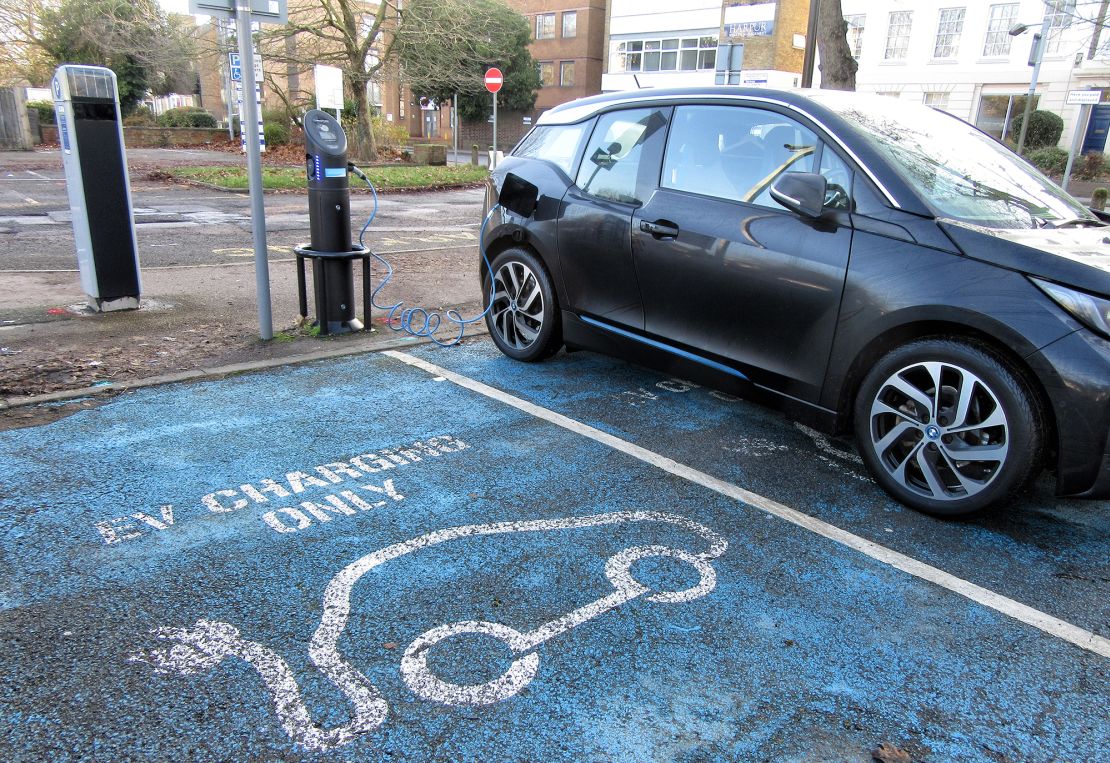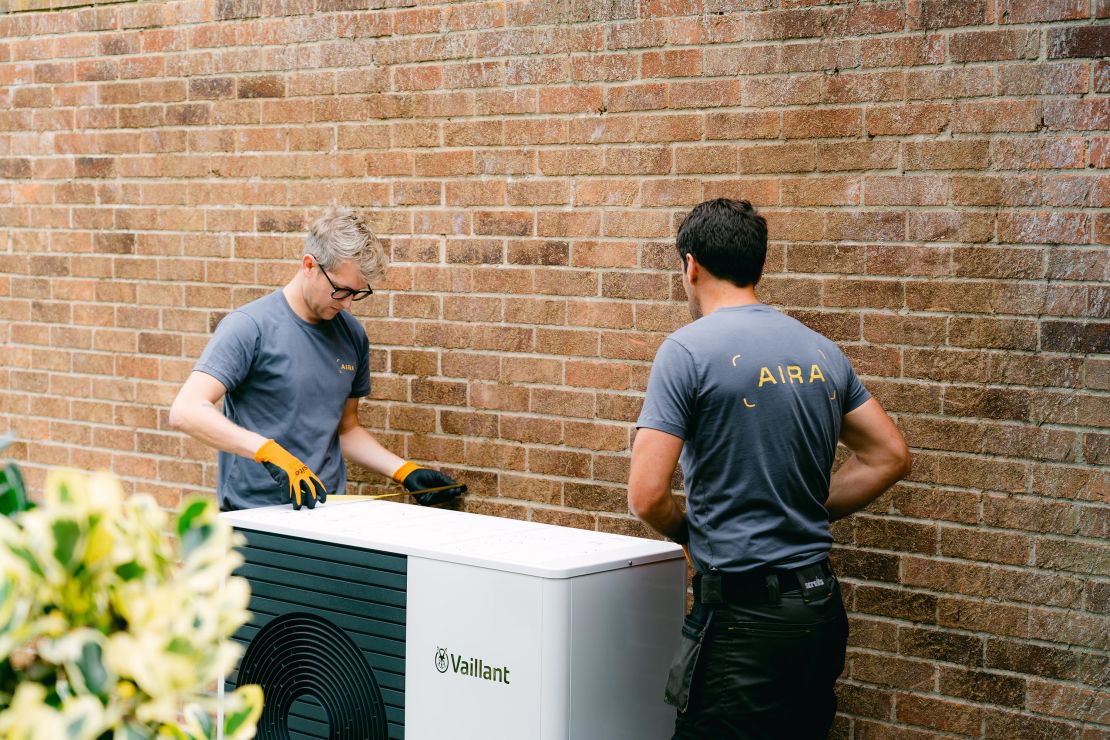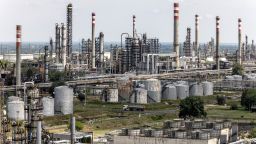“All the rich can afford a new car,” an elderly British woman commented at a recent protest in London against plans to expand a toll on older, polluting vehicles to outer suburbs of the city. “It’s affecting so many poor people… Everybody wants clean air but it’s all about money,” she told Times Radio.
Her comments encapsulate growing resistance to pro-climate measures because of the costs they can impose on already stretched household budgets or the hassle they add to daily lives.
Many people have seen their incomes eroded over the past 18 months by soaring food and energy bills and high borrowing costs. Even among those who accept that climate action is needed, rising numbers are unwilling or unable to shoulder additional expenses in these circumstances.
“Across Europe, a backlash against net-zero policy is underway,” Brett Meyer and Tone Langengen at the Tony Blair Institute for Global Change, a think tank, wrote in August.
Net-zero policy refers to measures to reduce planet-heating pollution. Scientists say greenhouse gas emissions must go down to zero by 2050 on a net basis — in other words, after accounting for emissions released into and removed from the atmosphere — to avoid catastrophic climate change.
“While polls show that an overwhelming majority believe climate change is a problem and support policies to address it, that support starts to fall once green policies come into force and people begin to experience their costs,” Langengen and Meyer said.
Why public attitudes matter
Take two recent opinion polls. In a 2022 Pew survey covering 19 countries in North America, Europe and the Asia-Pacific region, climate change was named the top global threat. In Europe, more respondents said it was a threat to their country than at any time in the past two decades.
“The results come as wildfires and extreme heat across Europe cause massive disruption to life,” the Pew researchers wrote in August last year, before another bout of deadly wildfires ravaged Greece this summer.
Yet, in a survey earlier this year conducted in 29 countries by Ipsos, only 30% of respondents said they would be willing to pay more in taxes to help prevent climate change.
Public attitudes “matter a lot” for reaching net-zero emissions because of the fundamental changes the transition will require, said Anna Valero, a distinguished policy fellow at the London School of Economics and Political Science (LSE).
“What we’re talking about is large-scale structural change that will affect people’s lives,” she told CNN. From the way they heat their homes and the cars they drive, to the skills they need to do the jobs necessary for the transition, everything is in flux.
Since citizens are voters, consumers and workers, they will “determine the feasibility of different things,” she added. “There’s a limit to what policymakers can do if the public don’t support their program. And there’s a limit to what businesses will do if the consumers won’t purchase those more environmentally sustainable options.”

One of the most high-profile options is to switch to an electric car. But consumer demand is already waning.
Earlier this month, the CEO of Volkswagen, Oliver Blume, cited a “sluggish ramp-up” of the electric vehicle (EV) market in Europe as a reason for the carmaker’s decision not to build additional battery factories for now, beyond the three plants it is already planning. “There is for the time being no business rationale for deciding on further sites,” he said in a statement.
Sales data compiled by HSBC shows that carmakers in the United Kingdom, Germany and the United States are having to offer discounts and cheap financing to counter weaker-than-expected demand for EVs.
“In the UK, not only are the discounts on the rise, the activity seems to be spreading to more brands,” the bank’s auto analysts wrote in a note last month.
Backpedaling by policymakers doesn’t help. In September, UK Prime Minister Rishi Sunak watered down the government’s climate strategy, delaying a ban on the sale of new gas and diesel cars by five years among other changes.
Ford (F), which had hoped the government’s earlier timeline would boost demand for EVs, was sharply critical of Sunak’s decision to push it out to 2035.
Sustained discounting may be needed to encourage more motorists around the world to switch to EVs. For example, in the United States, going electric still means paying a premium over the typical gas-powered model: the average price of a new EV was $51,762 in October compared with $47,936 across all vehicles, according to auto research firm Kelley Blue Book.
‘There is no trade-off’
But high upfront costs mask the fact that climate-friendly products such as EVs and heat pumps will likely save consumers money down the line.
The UK government’s own independent adviser on climate strategy, the Climate Change Committee, said delaying the ban on gas-guzzling cars is likely to increase motoring costs for households.
“Electric vehicles will be significantly cheaper than petrol and diesel vehicles to own and operate over their lifetimes, so any undermining of their rollout will ultimately increase costs,” the committee wrote in a report last month.
The same is true of heat pumps. These use electricity to transfer heat from a source, such as the air or ground, and are standard in Scandinavian countries including Norway and Sweden, which have bitter winters.
Because of their energy efficiency, heat pumps would reduce the average UK household’s heating bill by 25% and slash the average home’s carbon emissions by 75%, according to Swedish heat pump firm Aira.

“There is no trade-off between (installing a heat pump), saving the planet and at the same time saving the pockets of consumers,” CEO Martin Lewerth told CNN.
A heat pump is around three to seven times more expensive than a typical boiler powered by natural gas when accounting for both its price and the installation cost. In Britain, even the more generous £7,500 ($9,400) government grant that Sunak unveiled in September won’t fully offset the difference in many cases.
The limited number of engineers able to install and service heat pumps is another hindrance, and also adds to costs.
“If you’re living outside Scandinavia and you want a heat pump, it’s not a hassle-free experience,” Lewerth acknowledged. To address these challenges, Aira, which launched in the UK Monday, is offering monthly payment plans. The firm is also opening “Aira Academies” across Europe to retrain gas boiler installers and turn them into “clean energy experts.”
“Replacing one gas boiler with an electric heat pump will basically mean taking two (combustion engine) cars off the street,” Lewerth said. “Once people understand this is actually cheaper and a better solution… then it’s self-propelling.”
The cost of delay
Conversely, delaying the implementation of net-zero measures at a time when scientists say climate action needs to be accelerated will hit consumers’ pockets harder in the long run — and cost the planet dearly.
“There is no scenario in which delay is the cheaper option with climate change,” said Bob Ward, policy and communications director at the Grantham Research Institute on Climate Change and the Environment at the LSE.
“The cost of the transition, while significant, is nowhere near the cost of dealing with the consequences (of climate change).”
In the first six months of 2023, economic losses from natural disasters, which scientists say are becoming more frequent and severe as a result of climate change, amounted to $120 billion, according to insurer Swiss Re. That’s 46% above the first-half average over the previous 10 years.
In the United States alone, extreme weather events cost the economy close to $150 billion a year and disproportionately affect poor and disadvantaged communities, according to the government. And that estimate doesn’t account for loss of life or health care-related costs.
Beyond the economic damage from climate change, there is also a hefty price tag associated with continued dependence on fossil fuels, including natural gas — as was painfully demonstrated by the spike in European energy bills as a result of the war in Ukraine.
“If we’d invested more in renewable energy… energy bills wouldn’t have gone up so much, which disproportionately impacted on poor households,” Valero at the LSE told CNN.
In a similar vein, cleaner air can have economic benefits. A 2020 study by the Confederation of British Industry, a business lobby group, concluded that expanding London’s Ultra Low Emission Zone — the target of the recent protest in London — would meaningfully boost workforce participation and productivity by improving people’s health.
So it’s clear that weaning economies off fossil fuels, while costly and disruptive in the short term, will deliver substantial returns in the long run.
The job of governments, then, is to ensure that the upfront costs of reaching net zero do not fall on the poor, even if that means that “at some point rich people have to pay more,” according to Tim Jackson, the director of the Centre for the Understanding of Sustainable Prosperity at the University of Surrey in the UK.
“We have to think about where the burden of that cost falls now,” he told CNN. “It’s clear it shouldn’t fall on the poorest. That means that if there are costs… even if these are investment costs with returns later on, then to some extent they should fall on people who can afford to pay them.”
The Link LonkNovember 28, 2023 at 06:17PM
https://news.google.com/rss/articles/CBMiWGh0dHBzOi8vd3d3LmNubi5jb20vMjAyMy8xMS8yOC9idXNpbmVzcy9jbGltYXRlLXBvbGljaWVzLWNvbnN1bWVycy1vcHBvc2l0aW9uL2luZGV4Lmh0bWzSAVxodHRwczovL2FtcC5jbm4uY29tL2Nubi8yMDIzLzExLzI4L2J1c2luZXNzL2NsaW1hdGUtcG9saWNpZXMtY29uc3VtZXJzLW9wcG9zaXRpb24vaW5kZXguaHRtbA?oc=5
Who can afford to go green? Hard-pressed consumers are pushing back - CNN
https://news.google.com/search?q=hard&hl=en-US&gl=US&ceid=US:en



No comments:
Post a Comment